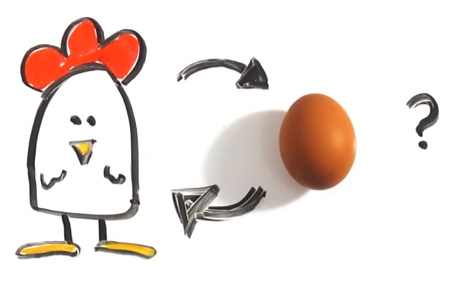As I read and wrestled with this week’s scripture I thought of the classic dictum “which came first? The chicken or the egg.” I hear Jesus teaching about love through a similar paradox. 1 John 4:19 says that “We love because he first loved us.” Our love of God, of others and ourselves is rooted in the mysterious grace that God loves and loved us before we were knitted together in the womb of our mothers. It’s a love that can’t be earned. It’s a love that chooses us, while giving us the freedom to chose in return. Jean Calvin, the patriarch of the Reformed or Presbyterian Tradition during the Reformation, articulated his theology in the Institutes of the Christian Religion. Hundreds of pages long, this letter to the French King to explain Protestantism, gives the summarization of faith as a thank you. Faith is our thank you to God’s original love in creation and in Christ. Everything we do is in response to that original love, not to become worthy of it, but because gratitude and “paying it forward” is the only authentic response to such grace. Loving and being loved are inseparably intertwined; not in a co-dependent way; but rather in a mutually enriching and life-giving symbiosis.
In his Asian Journal, Thomas Merton writes about this mystery as communion – “…I stand among you as one who offers a small message of hope, that first, there are always people who dare to seek on the margin of society, who are not dependent on social acceptance, not dependent on social routine, and prefer a kind of free-floating existence under a state of risk. And among these people, if they are faithful to their own calling, to their own vocation, and to their own message from God, communication on the deepest level is possible. And the deepest level of communication is not communication, but communion. It is wordless. It is beyond words, and it is beyond speech and beyond concept.”
Our selection today is an interpretative expansion of the parable allegory in verses 1 -8. We are invited, called, exhorted, created to remain in God’s love, to receive it as a branch receives nourishing sap from the vine, in view of creating fruit. This fruit is necessarily good – what plant tries to grow rotten fruit? Spoken long before Paul wrote his pastoral letter to the churches of ancient Galatia (modern day Turkey) in which he wrote “By contrast, the fruit of the Spirit is love, joy, peace, patience, kindness, generosity, faithfulness, gentleness, and self-control. There is no law against such things.” Gal 5:22-23 Paul’s point is that this fruit is contrasted with the natural fruit of the world, of human nature.
Naturally we seek to preserve and extend our life. It’s the principal of evolution. It’s also the key to capitalism and most modern political and social thought. Yet Jesus says that a true friend, one who really loves, is the one who will lay down his or her own life for another. We think literally of the death of Jesus on the cross. And I also think automatically of the people in my own life who gave of their own life-force, energy, time and resources to love me.
We are appointed that task. We are called to love not because we’re capable of it, but because we ourselves our loved. Loving in return completes our joy, is the radically freeing fulfillment of all that we were created to be. It’s our purpose. So why is it so hard to do? – not just in Baltimore, or Texas, or Eastern Syria; but in our own cities, work places, churches, neighborhoods and families.
Questions for going deeper:
1. What word or phrase grabs your attention in today’s selection?
2. How does that word or phrase touch your life today?
3. How is the Spirit of God inviting you to act, to be, to do or to speak through this text?
